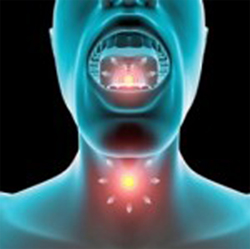Hoarseness Homeopathy

Abnormal changes in the voice are called “hoarseness.” When hoarse, the voice may sound breathy, raspy, strained, or show changes in volume or pitch. Voice changes are related to disorders in the sound-producing parts (vocal folds) of the voice box (larynx). While breathing, the vocal folds remain apart. When speaking or singing, they come together and, as air leaves the lungs, they vibrate, producing sound. Swelling or lumps on the vocal folds hinder vibration, altering voice quality, volume, and pitch.
What are the causes of hoarseness?
Acute Laryngitis: swelling of the vocal folds that occurs during a common cold, upper respiratory tract viral infection, or from voice strain. Serious injury to the vocal folds can result from strenuous voice use during an episode of acute laryngitis.
Voice Misuse:
Speaking in noisy situations
Excessive use
Telephone use with the handset cradled to the shoulder
Using an inappropriate pitch when speaking
Not using amplification when public speaking
Gastroesophageal Reflux (GERD):
occurs when stomach acid comes up the esophagus and irritates the vocal folds. Other typical symptoms of GERD include heartburn and regurgitation. Usually, the voice is worse in the morning and improves during the day. These people may have a sensation of a lump or mucus in their throat and have an excessive desire to clear it.
Laryngopharyngeal Reflux (LPRD):
If the reflux makes it all the way up through the upper sphincter and into the back of the throat, it is called LPRD rather than GERD. The structures in the throat (pharynx, larynx, and lungs) are much more sensitive to stomach acid and digestive enzymes, so smaller amounts of the reflux into this area can result in more damage. Many patients with LPRD do not have heartburn or other classic symptoms of GERD.
Smoking:
Smoking is the major cause of throat cancer, if smokers become hoarse, they should see an otolaryngologist.
Neurological Diseases or Disorders:
can also appear in those who have neurological diseases such as Parkinson’s or a stroke, or it may be a symptom of spasmodic dysphonia, a rare neurological disorder that usually affects only the voice, and sometimes breathing. A paralyzed vocal fold may be the cause of a weak, breathy voice. If the hoarseness persists for more than three months and other causes have been ruled out, a neurologist may be helpful for diagnosis.
Other Causes:
These include allergies, thyroid problems, trauma to the voice box, and, occasionally, menstruation. Very serious conditions such as laryngeal cancer can also cause hoarseness.
How to prevent hoarseness:
Specialists in speech/language pathology (voice therapists) are trained to assist patients in behavior modification to help eliminate some voice disorders. Patients who have developed bad habits, such as smoking or overusing their voice by yelling and screaming, benefit most from this conservative approach. The speech/language pathologist may teach patients to alter their methods of speech production to improve the sound of the voice and to resolve problems, such as vocal nodules. When a patient’s problem is specifically related to singing, a singing teacher may help to improve the patients’ singing techniques.
Prevention tips:
Avoid smoking.
Avoid agents that dehydrate the body, such as alcohol and caffeine.
Avoid secondhand smoke.
Stay hydrated—drink plenty of water.
Humidify your home.
Watch your diet—avoid spicy foods.
Try not to use your voice too long or too loudly.
Use a microphone if possible in situations where you need to project your voice.
Seek professional voice training.
Avoid speaking or singing when your voice is injured or hoarse.